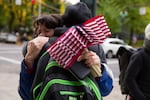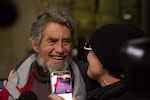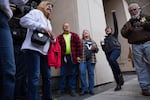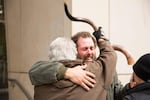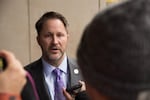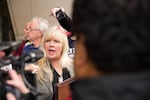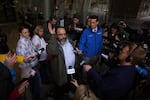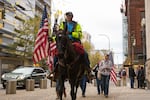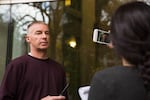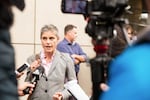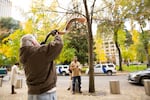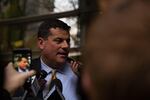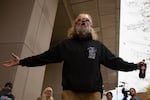[video: bundy-verdict,left,58128d9b08c0e9002d7569cf]
The end of the six-week trial for seven people who took over the Malheur National Wildlife Refuge in eastern Oregon can be summed up in two words: not guilty.
A 12-person jury found occupation leaders Ammon and Ryan Bundy not guilty Thursday of the government's primary charge: conspiracy to impede federal officers by force, threat or intimidation. Their five co-defendants — Jeff Banta, Shawna Cox, David Fry, Kenneth Medenbach and Neil Wampler — have all been found not guilty as well.
Jurors were unable to reach a verdict on Ryan Bundy's theft of government property charge.
Lisa Ludwig, standby counsel for pro se defendant Ryan Bundy, said her client and the rest of the defense attorneys had a simple approach.
"He appealed to common sense," Ludwig said.
The jury returned its verdict after less than six hours of deliberations with a new jury member, who entered the process after a last-minute replacement of a juror when a question surfaced that he was biased.
The jury was instructed to disregard days of previous work and to re-consider the evidence.
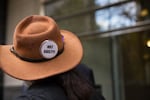
A supporter displays a "NOT GUILTY!" button following the not guilty verdict delivered in the trial of seven occupiers of the Malheur National Wildlife Refuge.
Bradley W. Parks / OPB
On Thursday, U.S. District Court Judge Anna Brown — whose coffee mug appeared to read "It is what it is" — began by reading out the not guilty verdict for Ammon Bundy, the leader of the occupation.
"Did I read the verdict correctly?" Brown asked the jury for confirmation.
There was little reaction in the courtroom to Bundy's acquittal, but it quickly became clear that no one in the case would be found guilty of the alleged conspiracy to impede federal workers from doing their jobs.
The seven acquittals came on the birthday of president Theodore Roosevelt, Oct. 27, 1858. Roosevelt was a champion for public lands who created the Malheur National Wildlife Refuge near Burns, Oregon by a presidential order in 1908.
Despite the victory in court, Ammon Bundy attorney Marcus Mumford insisted the acquittal did not go far enough.
After the verdicts were read, Mumford told Brown his client should be allowed to go free. Ammon Bundy is scheduled for transfer to Nevada, where he faces charges for the Bunkerville standoff.
Brown told Mumford that his client was not allowed to leave, but the attorney persisted, raising his voice as he argued with the judge. The incident ended with Mumford being tackled by several U.S. Marshals and Brown clearing the courtroom.
"There’s a hold for Ammon Bundy and Ryan Bundy out of the district of Nevada," said Matt Schindler, hybrid counsel for defendant Kenneth Medenbach, following the verdict.
"There’s nothing Judge Brown can do about that," Schindler said. "So acquitting him here, all it does is effectively release him to that hold, to be transported to Nevada.
"Marcus let the emotion of the moment, I think, overtake his better judgement," Schindler said.
Despite the scuffle, the defendants and their attorneys were elated with Thursday's trial result.
[video: 10272016-bundy-cox-interview,left,5812900c0f7b7800215b5e71]
"We came to Oregon — to Harney County — seeking justice," defendant Neil Wampler said after his acquittal, "and today we found it."
Wampler said he and others within the so-called patriot movement plan to "build on this tremendous victory for rural America."
The message of the acquittals opening the door for future protests was something defendant Shawna Cox directly addressed on the steps of the Mark O. Hatfield United States Courthouse in Portland.
"Absolutely," Cox said when asked if she will participate in future protests. "We can do it peacefully."
Cox called Thursday's outcome "just one win" in a larger movement to change how the federal government manages land in the American West.
United States Attorney for the District of Oregon Billy J. Williams was less pleased with the outcome.
"While we had hoped for a different outcome, we respect the verdict of the jury and thank them for their dedicated service during this long and difficult trial," Williams said in a statement.
The charges stem from the 41-day armed occupation of the wildlife refuge in eastern Oregon’s high desert. The armed protest began Jan. 2 and ended when the final four occupiers surrendered to the FBI on Feb. 11.
During its case, prosecutors presented dozens of firearms and thousands of rounds of ammunition investigators recovered from the refuge after the occupation.
Prosecutors initially charged Ammon Bundy, his brother Ryan Bundy, and 24 others with conspiracy to prevent Bureau of Land Management and U.S. Fish and Wildlife employees from doing their jobs. Some defendants named in the indictment also faced weapons charges for carrying firearms in a federal facility, as well as theft of government property.
Only seven defendants went to trial in September. Others have pleaded guilty or are scheduled to go to trial in February 2017. It was not immediately clear what effect the acquittals will have on pending Oregon case.
Related: 41 Days: An OPB Documentary On The Oregon Occupation
Throughout the government’s case, prosecutors attempted to show the jury evidence about when the alleged conspiracy began, as well as how the occupation unfolded and ultimately ended.
The government relied heavily on testimony from law enforcement, including Harney County Sheriff David Ward, as well as dozens of FBI agents who responded to the occupation or processed evidence at the Malheur refuge after the occupation ended.
“At the end of the day, there is an element of common sense that demonstrates the guilt of these defendants,” Assistant U.S. Attorney Ethan Knight said in his closing arguments during the trial. “These defendants took over a wildlife refuge and it wasn’t theirs.”
Conversely, the defense sought to make its case about a political protest — one about protesting the federal government’s ownership and management of public lands.
“The people have to insist that the government is not our master; they are our servants,” Ryan Bundy said during his closing statement to the jury.
Bundy added the occupation had “nothing to do with impeding and preventing the employees of the Malheur National Wildlife Refuge.”
The occupation fueled a long running debate about the role of the federal government when it comes of managing public lands, especially for ranching and other natural resource-based professions.
Throughout the armed protest, Ammon Bundy frequently said their goal was to shift the federally owned land to local control. During press conferences and interviews, Bundy frequently said he wanted to “get the ranchers back to ranching, get the loggers back to logging and miners back to mining.”
While federal prosecutors worked to keep their case focused on conspiracy, the trial quickly came to symbolize the growing divide between urban and rural America.
“How did any of these people benefit from protesting the death of rural America?” attorney Schindler said during his closing statement to the jury.
Five of the seven defendants took the stand in their own defense during the trial. Ammon Bundy’s testimony — a centerpiece of the defense — stretched over the course of three days and included stories about growing up on a ranch and his family role in the 2014 armed standoff in Bunkerville, Nevada.
With the first Oregon trial concluded, the Bundy brothers and several other defendants who participated in the Malheur occupation will now travel to Nevada, where they face charges for their roles in a 2014 armed standoff that took place on their father's ranch near Bunkerville, Nevada.
Subscribe To 'This Land Is Our Land'
Subscribe to "This Land Is Our Land" on NPR One, Apple Podcasts or wherever you find your podcasts. Find comprehensive trial coverage at OPB.org/ThisLand.
Share your thoughts on the trial with us on Facebook and Twitter, or by emailing us directly at thisland@opb.org.
